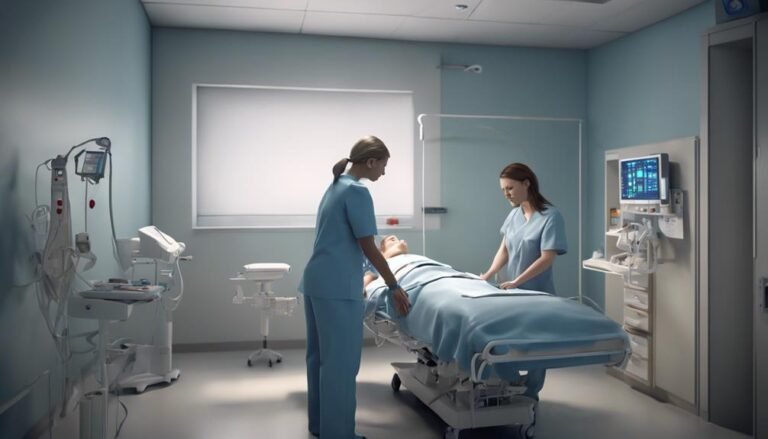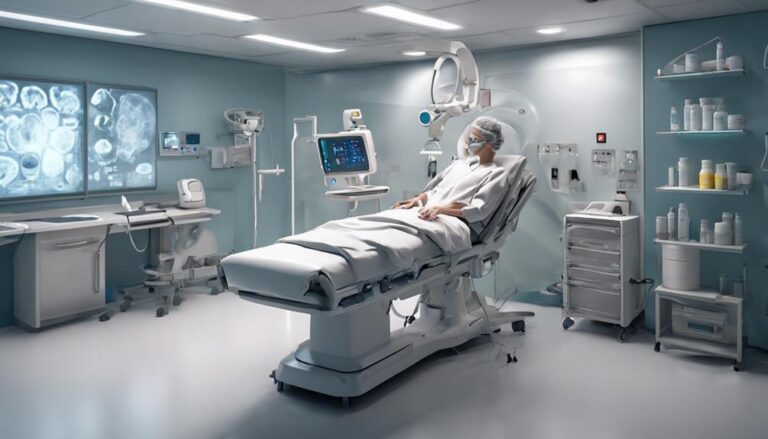Medical Assistant Job Description
A medical assistant supports healthcare providers by managing clinical and administrative tasks. Responsibilities include preparing treatment rooms, assisting during procedures, and updating health records. Communication and time management skills are vital, alongside the ability to provide exceptional patient care. Educational requirements typically include a high school diploma or equivalent, with post-secondary education enhancing job prospects. Certification options such as CMA or RMA validate skills and knowledge. Medical assistants work in various settings like physician offices and hospitals, requiring strong teamwork and communication. Understanding salary expectations and job outlook is essential. Further details expand on the profession's diverse roles and growing demand within healthcare.
Key Takeaways
- Prepare treatment rooms and assist healthcare providers during procedures.
- Sterilize medical instruments and perform vital signs measurements.
- Update electronic health records and handle administrative tasks.
- Communication, time management, and patient care skills are essential.
- High school diploma required, with optional post-secondary education for better prospects.
Key Responsibilities
In the role of a medical assistant, the key responsibilities encompass a wide range of critical and important clinical and administrative tasks essential to the smooth operation of a healthcare facility. Daily tasks include preparing treatment rooms for patient examinations, sterilizing medical instruments, and assisting healthcare providers during procedures. Medical assistants also perform essential signs measurements, obtain patient medical histories, and update electronic health records to guarantee accurate documentation of patient information.
Patient care is a fundamental aspect of a medical assistant's role, involving direct interaction with patients to provide support and assistance. Medical assistants communicate with patients to explain treatment procedures, educate them on medication usage, and answer their questions regarding healthcare services. Additionally, they schedule patient appointments, arrange for laboratory tests, and facilitate referrals to specialists as needed. Ensuring patient comfort and confidentiality is paramount, requiring medical assistants to maintain a professional and compassionate demeanor at all times. Overall, medical assistants play a critical role in delivering quality healthcare services by efficiently managing clinical tasks and providing compassionate care to patients.
Required Skills
Proficiency in a diverse set of technical and interpersonal skills is essential for excelling in the role of a medical assistant. Communication skills are paramount as medical assistants interact with patients, physicians, and other healthcare professionals daily. Clear and effective communication guarantees accurate exchange of information, fostering a positive patient experience. Additionally, strong time management skills are critical to handle multiple tasks efficiently in a fast-paced healthcare environment.
In addition to communication and time management, medical assistants must possess exceptional patient care abilities. They must be empathetic, compassionate, and attentive to patients' needs to provide high-quality care. This involves assisting patients with procedures, taking vital signs, and addressing their concerns with professionalism and care.
Furthermore, medical assistants are responsible for various administrative tasks, such as scheduling appointments, maintaining medical records, and handling billing procedures. Proficiency in administrative duties is key to ensuring the smooth operation of the healthcare facility and supporting the overall patient care process.
Educational Requirements
When considering the educational requirements for a medical assistant position, it is essential to look at the required education levels, certifications, and training.
Medical assistants often need to complete specialized coursework to gain the necessary knowledge and skills for their role. Employers typically seek candidates who have completed accredited programs and hold relevant certifications to guarantee they are well-prepared for the demands of the job.
Required Education Levels
Successful applicants for medical assistant positions must meet specific educational requirements to be considered for the role. Most employers seek candidates with a high school diploma or equivalent. However, pursuing post-secondary education through a medical assistant program can enhance job prospects.
These programs typically result in a certificate or diploma and cover courses such as anatomy, medical terminology, and clinical procedures. Some employers may prefer candidates with an associate degree in medical assisting, which provides more in-depth knowledge and skills. Higher education levels can lead to increased opportunities for career advancement and may qualify individuals for specialized roles within healthcare settings.
While experience levels play an essential role in job progression, a solid educational foundation is essential for a successful medical assistant career.
Certification and Training
To pursue a career as a medical assistant, individuals must complete specific certification and training requirements. This involves gaining hands-on experience and practical skills essential for the role. Medical assistant programs typically include both classroom learning and practical training in a healthcare setting. These programs cover topics such as medical terminology, anatomy, and basic patient care. Additionally, aspiring medical assistants often need to complete an externship to apply their knowledge in a real-world setting. Upon completing the necessary training, individuals can then sit for a certification exam to become a Certified Medical Assistant (CMA) or a Registered Medical Assistant (RMA). This certification demonstrates proficiency in the field and can enhance job prospects.
| Certification and Training Requirements | Description |
|---|---|
| Hands-on Experience | Gain practical skills in a healthcare setting. |
| Practical Skills | Learn medical terminology, patient care, and more through classroom and real-world training. |
Specialized Coursework Needed
Specialized coursework needed for aspiring medical assistants includes in-depth study of topics such as medical terminology, pharmacology, and medical office procedures. Understanding medical terminology is essential for effective communication with healthcare professionals and patients.
Pharmacology courses provide knowledge of medications, their uses, and potential interactions. Medical office procedures cover administrative tasks like scheduling appointments, billing, and medical records management.
In addition to coursework, clinical experience is important for medical assistants to apply theoretical knowledge in real-world healthcare settings. Hands-on training allows students to practice essential skills such as taking vital signs, preparing patients for examinations, and assisting with minor procedures.
This combination of education and practical experience equips medical assistants with the necessary skills to succeed in their role.
Certification Options
When pursuing a career as a medical assistant, exploring the various certification options available is crucial for guaranteeing competence and credibility in the field. Here are three key certification options to contemplate:
- Certified Medical Assistant (CMA): Offered by the American Association of Medical Assistants (AAMA), this certification demonstrates a high level of proficiency in various areas such as medical office management, patient care, and medical procedures.
- Registered Medical Assistant (RMA): Provided by American Medical Technologists (AMT), this certification also validates the skills and knowledge required for medical assistants. RMAs are required to meet specific eligibility criteria and pass an exam.
- National Certified Medical Assistant (NCMA): Offered by the National Center for Competency Testing (NCCT), this certification acknowledges individuals who have showcased the necessary skills to excel in the field of medical assisting.
These certifications can be obtained through a combination of online programs and continuing education to ensure that medical assistants stay updated with the latest industry standards and practices.
Work Environment
In the healthcare industry, medical assistants typically work in a variety of settings, including physician offices, hospitals, and outpatient care centers. The work environment for medical assistants is vital, requiring strong workplace dynamics and effective team collaboration. Medical assistants often interact with patients, physicians, and other healthcare professionals, necessitating clear communication and a cooperative approach to patient care.
Managing stress is essential in this fast-paced environment. Medical assistants must be able to handle multiple tasks efficiently while remaining calm and composed. Employing stress management techniques, such as prioritizing tasks and practicing mindfulness, can help maintain a balanced work life. Additionally, achieving work-life balance is crucial for sustaining job satisfaction and overall well-being. Medical assistants may need to adapt their schedules to accommodate patient needs, which highlights the importance of personal time management and self-care practices.
Navigating the complexities of the healthcare system requires medical assistants to cultivate resilience, flexibility, and a commitment to continuous improvement. By fostering a supportive work environment that values collaboration and individual well-being, medical assistants can thrive in their roles and deliver high-quality patient care.
Salary Expectations
Medical assistants' compensation packages typically reflect a combination of factors such as experience, location, and healthcare facility type. When pondering salary expectations in this field, it is vital to bear in mind the following:
- Salary Negotiations: Medical assistants can often negotiate their salaries based on their qualifications, certifications, and experience. Those with specialized skills or additional certifications may have higher earning potential.
- Benefits: In addition to base pay, medical assistants may receive benefits such as health insurance, retirement plans, paid time off, and continuing education opportunities. These benefits can greatly impact the overall compensation package and job satisfaction.
- Job Satisfaction and Job Security: While salary is important, job satisfaction and security are also pivotal factors to contemplate. Medical assistants who feel valued, have opportunities for growth, and work in a stable environment are likely to experience higher job satisfaction and security.
Taking into account these aspects alongside salary can help medical assistants make informed decisions about their compensation packages and overall career outlook.
Job Outlook
Considering the evolving landscape of healthcare and the increasing demand for medical services, the job outlook for medical assistants is characterized by a promising growth trajectory and expanding opportunities for career advancement. The employment growth for medical assistants is projected to be much faster than average compared to other occupations, driven by the aging population and advancements in medical technology. The industry demand for skilled medical assistants is high, with various healthcare settings seeking these professionals to support physicians and guarantee efficient patient care.
To provide a clearer picture of the job outlook for medical assistants, the table below outlines key statistics related to employment growth and industry demand:
| Statistics | Data |
|---|---|
| Employment Growth | Much faster than average |
| Industry Demand | High |
| Job Opportunities | Abundant in various healthcare settings |
| Career Advancement | Opportunities for growth and development |
As the healthcare sector continues to expand, medical assistants play a crucial role in supporting healthcare providers, making them essential members of the healthcare team.
Conclusion
To sum up, the role of a medical assistant involves a wide range of responsibilities, including administrative tasks and patient care. With the right skills, education, and certification, medical assistants can thrive in a dynamic work environment.
Despite potential challenges in managing multiple tasks simultaneously, medical assistants play a vital role in supporting healthcare professionals and ensuring the smooth operation of medical facilities.







